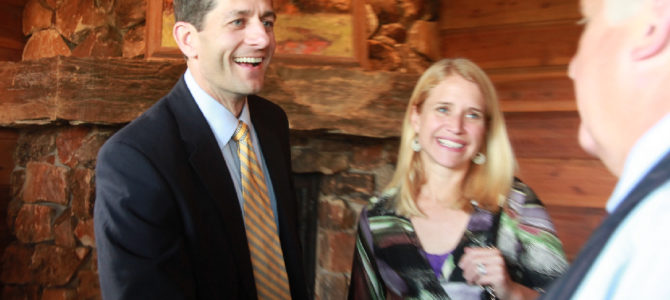
What, exactly, are we teaching our kids? Having just started Sen. Ben Sasse’s new book on raising kids to be thoughtful citizens, this question has been on my mind. But seeing The Hill report that “nearly 100 eighth graders from New Jersey decided to sit out a group photo with House Speaker Paul Ryan (R-Wis.) during a class trip to Washington, D.C. on Friday” gave me serious pause. As in, really?
I still remember my own eighth-grade trip to Washington. Growing up in New York, we all looked forward to that annual school trip. It was a big deal. Yuge.
We drove down from New York on a big bus, stayed in a hotel, and visited the U.S. Capitol. For me, a highlight of that visit was seeing NPR’s Cokie Roberts walk by in the Capitol. Of course, none of my classmates shared my excitement, as I was the only one who recognized her. (My father regularly watched Sunday morning talk shows, so I sometimes did too.)
The other high point that day was visiting our congresswoman in her office. Visiting Rep. Nita Lowey’s office felt like walking into an embassy for my hometown. The congresswoman was gracious and welcoming, kindly taking a picture with all of us, which she autographed and I kept. I’m still in touch with a bunch of my old classmates on Facebook. However, that black and white photograph is probably the most meaningful memento I have from a trip that fascinated me, as someone who already had a budding interest in politics and public service.
Respecting American Leaders Is a Mark of Maturity
This brings me back to those eighth graders from New Jersey. The Hill quotes three students. The first said she didn’t want to be in a picture with Ryan because it would indicate agreement with his political beliefs. I don’t believe a big group photo suggests any sort of endorsement, so I don’t think that should have been an issue.
The second reported opting out because of Ryan and President Trump’s many shared beliefs. I actually don’t see so many shared beliefs there, but wonder what this student had in mind. The third student, Alex Klint, commented, “I thought it would be interesting to see one of the nation’s lawmakers in person even if I strongly disagree with many of his views.” I can get on board with that.
No one has to agree with Ryan, or any other member of Congress, for that matter. But what ever happened to basic manners? Lowey is a liberal Democrat. Beyond our shared support for a strong U.S.-Israel relationship, I’m not sure that we agree on much of anything. That said, I can’t imagine having refused to pose in a group picture with her. That would have felt disgracefully rude. If I had had the opportunity to meet the speaker of the House that same day, I would have been thrilled to meet someone of historical importance, all politics aside.
Let’s Consider the Parents’ Influence Here
Given the age of the kids in the Ryan brouhaha, I have a hard time believing this decision to “sit in a parking lot while their peers took part in the photo op” was their idea. Most 13- and 14-year-olds have neither read widely enough nor lived long enough to have fully formed, independent political views; they are more likely to parrot whatever they’ve learned from trusted adults. That’s why this behavior strikes me as not being about students standing up for their principles, as some people replied when I tweeted about this. Rather, it looks more like something that parents or teachers encouraged, either explicitly or implicitly.
I'm glad we're teaching the next generation to associate only with people who agree with them politiically. https://t.co/9pf7lp9FAS
— Melissa Braunstein (@slowhoneybee) May 28, 2017
The action also recalls the Notre Dame University graduates recently walking out on Vice President Pence speaking at their commencement. Again, those students don’t have to like or share Pence’s views. The polite thing to do would have been to sit and listen. The bold thing to do would have been requesting a private meeting with Pence where they might have engaged and even argued about ideas, rather than simply exiting en masse.
Democracy can’t function if we wall ourselves off, refusing to communicate or debate ideas. Engaged citizens must be able to think critically and articulate why one view is superior to another. Having spent six years as a student on a very liberal university campus, where professors and speakers regularly offered opinions I didn’t share, I can attest that not only did I survive, but I thrived. Regular exposure to differing views helped to sharpen my thinking and reasoning abilities. I believe my education was more valuable for it.
As a parent, I try to be mindful of what behavior I’m modeling, because I know my children are always watching. I don’t want to teach my daughters that they can only befriend or respect individuals who share our family’s particular politics. I want them to behave respectfully toward every individual they meet. I tell them we don’t have to be friends with everyone, but we are polite to everyone.
There are plenty of wonderful people worth knowing who happen to vote differently, and I’m glad to have their friendship. But am I an increasing anomaly? I certainly hope not. I don’t want my children growing up in a world where we don’t respect our elected officials, or even the offices they represent. I don’t want my kids’ friendships to be curtailed by politics. I especially don’t want my children believing that good manners are optional. A basic level of civility is necessary for society to function.
As our politics become more polarized and vitriolic, we should remember that our children are watching us for clues about what to believe and how to behave. So again, let’s pause and consider: What are we teaching our children?









